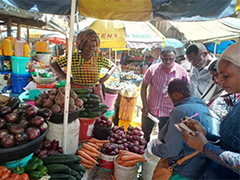Project for Strengthening DADP Planning and Implementation Capacity through Use of SHEP Approach (TANSHEP)
| Type | Project | Area | Period | Tanzania Organization |
Cost (Mill. Yen) |
|---|---|---|---|---|---|
| Technical Cooperation Project | Project for Strengthening DADP Planning and Implementation Capacity through Use of SHEP Approach (TANSHEP) | Arusha Kilimanjaro Tanga |
Jan. 2019 - Dec. 2023 | Ministry of Agriculture (MoA), President Office-Regional Administration and Local Government (PO-RALG) | 770 |
Tanzania's horticulture sub-sector is growing rapidly and has increasingly become one of the major contributors of the agricultural sector, with an annual average growth of 11 percent which is twice the annual overall growth rate of agriculture. Currently, the sub-sector employs 4.5 million farmers comprised of both large-scale and small-scale farmers, majority of whom are women and youth.

Moreover, horticulture production is labor-intensive dominated by smallholder farmers who account for over 70% of the producers with land size less than 2 hectares. In recognition of horticulture's potential to the economy, the sub-sector has been identified as one of the priority Commodity Value Chain in the Agriculture Sector Development Program (ASDP) II. Most importantly, horticulture has contributed significantly to the attainment of various socio-economic benefits to the nation such as achievement of food security and nutrition, source of employment, source of raw materials for primary processing industries, as well as a source of foreign earnings to the nation.
Despite the identification of the horticulture as a priority sub sector in agriculture, it is constrained by multiple bottlenecks currently impeding the ability to transform the livelihoods of its farmers. These include; (1) Limited domestic market information service and linkage between farmers and market (2) Limited access to agriculture inputs, (3) Limited access to financing, and (4) Weak production and insufficient technology dissemination.
Based on this background, JICA has supported District Agricultural Development Plan (DADP) through "Technical Cooperation in Strengthening the Backstopping Capacities for the DADP Planning and Implementation (RADAG, 2009 - 2012)" and "RADAG Phase 2 (2012 - 2016)". Through these technical assistance interventions, the framework of DADP has been strengthened especially at the central level, but practical knowledge and experience to plan and implement DADP are still inadequate at the district level. To tackle those constraints, JICA, in collaboration with Ministry of Agriculture and President Office - Regional Administration and Local Government (PO-RALG), formulated a technical cooperation project called "Project for Strengthening DADP Planning and Implementation Capacity through Use of SHEP Approach (TANSHEP)"
Based on the outstanding performance in the previous SHEP projects in other African countries, TANSHEP focuses on promoting market oriented horticulture development by applying "Smallholder Horticulture Empowerment and Promotion" (SHEP) Approach initiated by JICA, which focuses on "Market - Oriented Agriculture" to DADPs. It encourages horticulture producers to conduct market survey first and collaborate with relevant stakeholders, e.g. buyers, input suppliers and even intermediaries, to improve production and marketability, to realize the increase of income for the betterment of rural livelihood in Tanzania. SHEP Approach will be able to guide district staff to plan and implement sure and cost-effective DADPs to achieve better profitability of farmers.
The Project developed a slogan "Anzia Sokoni Malizia Shambani Kwa Kipato Zaidi" which simply means "For more produce, start with market survey first".
The series of project activities (i.e. Baseline survey, Market Survey, and Match Making) by TANSHEP is expected to reach more than 3,000 farmers and extension officers in Arusha, Kilimanjaro and Tanga regions. Through such activities, farmers' mindsets are visibly changing from "Grow and Sell" to "Grow to Sell" (i.e. Farming as business).
About SHEP Approach in general:
TANSHEP leaflet
-
TANSHEP leaflet, August 2022 (English) (PDF/666KB)
-
TANSHEP leaflet, August 2022 (Swahili) (PDF/711KB)
-
TANSHEP leaflet, August 2020 (English) (PDF/406KB)
-
TANSHEP leaflet, August 2020 (Swahili) (PDF/391KB)
-
TANSHEP leaflet, August 2019 (English) (PDF/321KB)
-
TANSHEP leaflet, August 2019 (Swahili) (PDF/270KB)
SHEP Introduction and Good Practices





scroll